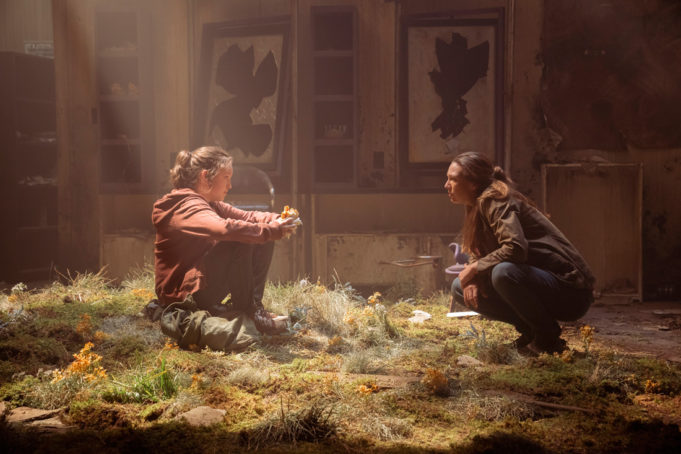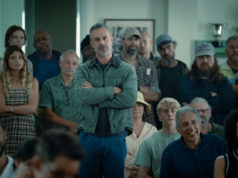Most of the video games I play are related to sports, but when I upgraded to a PlayStation 3 a decade ago, I asked a clerk at On Video in Arlington about renting a game to try out my system, and that’s how I ended up playing The Last of Us. I was struck by the attention to story and character in this third-person shooter that had more on its mind than just blasting everything that moved on the screen. I kept hearing about possible movie adaptations in the years since, but now HBO Max has turned it into a TV series, and as I write this after watching five of the first season’s nine episodes, I can say that it does deserve the buzz that it has been drawing.
It begins on Day 1 of the zombie apocalypse in September 2003, when Austin building subcontractor Joel Miller (Pedro Pascal) tries to get his family to safety only to see his teenage daughter (Nico Parker) killed not by the undead but by an American soldier who’s evidently been ordered to exterminate all human life. Twenty years later, what’s left of humanity is gathered in quarantine zones in large cities, and Joel is a sanitation worker and smuggler in Boston. With the federal government ruling the QZs with dictatorial power, a rebel group contacts Joel and his partner Tess (Anna Torv) and contracts them to transport a 14-year-old girl named Ellie (Bella Ramsey) to a safehouse outside the city. En route, they find out that Ellie was bitten by a zombie weeks before but has mysteriously remained uninfected.
The crucial part of a video game is the interactive element: You’re the one who’s fighting the dragon, taking out Nazis, or throwing the winning touchdown pass in the Super Bowl. TV and film haven’t found a meaningful way to replace that, so showrunners Craig Mazin and Neil Druckmann lean hard on the game’s other strengths. In the game, Joel meets Bill, a gay contact who shows him the corpse of his boyfriend, lynched by bandits. In the show, this becomes a piercing episode that traces the six-year arc of their relationship, as Bill (Nick Offerman) is a survivalist who first raids Home Depot and then his local wine shop after everyone else evacuates — that’s the guy you need to be with when the zombie apocalypse comes. He captures Frank (Murray Bartlett) in one of his man-traps but then falls in love with him and later nurses him when he becomes terminally ill. In a note left for Joel, Bill writes, “I used to hate the world, and I was happy when everyone died, but then I found someone worth saving.” The episode is entitled “Long, Long Time,” and the Linda Ronstadt song that gives the episode its name has never sounded sadder than when serving as the testament of the love these two men found against all odds.
Just as in the game, the pathogen that turns humans into zombies is spores of the Cordyceps fungus, so the revenants look newly terrifying for viewers unfamiliar with the game, with mushrooms bursting through their skin and sometimes covering every part of their heads except for their mouths. (The mushroom angle was also neatly picked up on in Saturday Night Live’s parody, with Pascal starring in HBO’s gritty, dystopian adaptation of Mario Kart.) The zombies make a spectacular entrance at the climax of a shattering Episode 5 set in Kansas City, where mob rule has driven out the government after the latter appeared to eradicate the undead. It should surprise no one that the pandemic has not caused people to band together, and Joel and Ellie are more often threatened by uninfected humans than by the zombies.
In the tradition of Game of Thrones and Westworld, this HBO fantasy series has a great computer-generated opening credit sequence with fungi overgrowing a city and the countryside. Ramsey brings some much-needed humor to the show as someone who’s very much a girl underneath her jaded exterior, and her fellow Game of Thrones alum Pascal makes a far more convincing Texan than you’d expect from a Chilean actor.
As we’ve seen, there’s nothing quite like a global pandemic to strain our institutions to the breaking point, and The Last of Us shows us what that means on a human level as individuals find their best and worst selves while making their way through a ruined landscape.













Done before 60 years ago. Matango or Attack of the Mushroom People (in U.S.). Good series, but original take is worth a look.